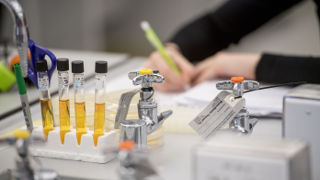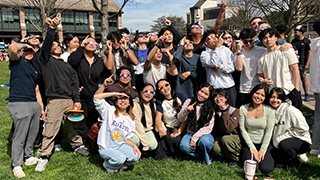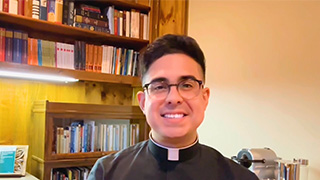Chemistry Final PhD Seminar
Saturday, March 24, 2018

The seminar will be held on Tuesday, March 27, 2018 from 5:45 p.m. to 7:00 p.m. in the Helen Lerner Amphitheater, Science and Technology Center, Seton Hall University. Refreshments are available at 5:30 p.m.
Hader Elashal received her B.S. in Biochemistry at Seton Hall University in 2014. After completion of her degree, she sought to continue her journey at Seton Hall and pursue a PhD degree in Chemistry. During her graduate studies, her research focused on the field of peptidomimetics, more specifically, peptide backbone modification. She has authored 5 first author publications and has presented her work at multiple prestigious conferences including APS and Gordon Research Conference, where she recently won an Honorable Mention Poster Award. Hader is also the recipient the Robert DeSimone Graduate Fellowship and last year's departmental Top Biochemistry Student award.
Peptides and proteins are among the most important components of life. They carry out many essential functions which include transporting molecules, serving as an energy source, and helping prevent infection. However, when the sequence of these peptides undergoes a mutation, an undesired change, the peptide disrupts regular body function and causes diseases such as Alzheimer's and Cataracts. In order to better understand these mutations and further characterize them, we developed a methodology based on an amino acid (peptide building block) modification that has the ability to break these peptides into more basic components for analysis. The same methodology has also been used to harness the drug properties of naturally occurring peptides. Breaking natural products into a simpler form aids in determining their structure-activity relationship, which can serve as a template for developing new drugs. Moreover, the abovementioned modification has been used in creating peptides with unique functional groups that give the peptides biological activity or can be used to develop more complex molecules.
The Department of Chemistry and Biochemistry offers B.S., M.S. and PhD degrees with specializations in all areas of chemistry. Our unique research environment, including traditional full-time students and part-time students is designed to foster collaborations with industry and colleagues in other disciplines. The Rose Mercadante Seminar Series is named for Rose Mercadante, the departmental secretary for over 40 years, in honor of our alumni, her "boys and girls."





